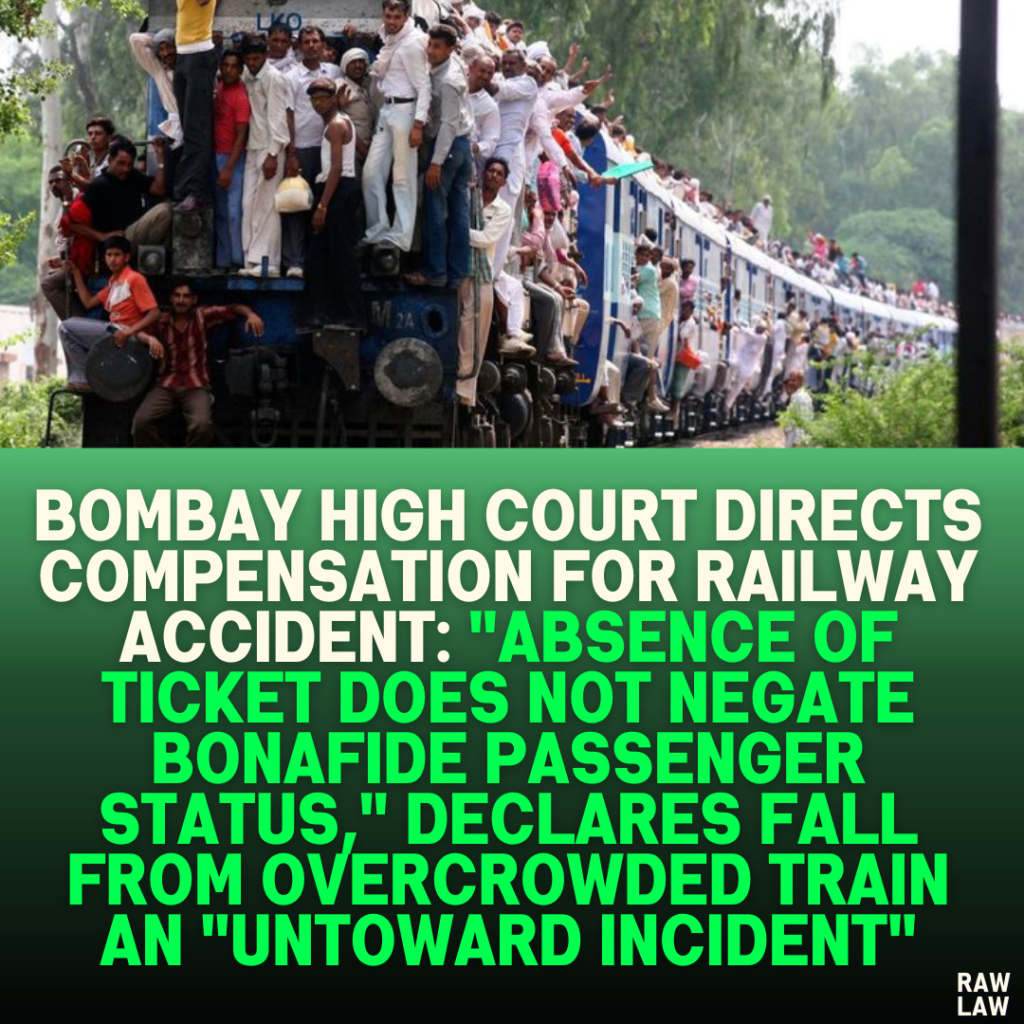Court’s Decision
The Bombay High Court overturned the Railway Claims Tribunal’s rejection of a compensation claim, holding that the appellants—the parents of a deceased passenger—had sufficiently proven their entitlement under the Railways Act, 1989. The court ordered the respondent, Central Railways, to pay ₹4 lakh each to the parents as compensation, with an 8-week timeline for payment. In case of default, interest at the rate of 7% p.a. would apply. The court emphasized that the tragic death of the deceased resulted from an untoward incident as defined under Section 123(c)(2) of the Railways Act, 1989.
Facts
- On May 8, 2010, the deceased, a daily commuter on Mumbai’s local train network, boarded a train from Wadala to Chinchpokli, holding a valid monthly pass.
- The train was overcrowded, and the deceased fell from the compartment due to the heavy rush of passengers.
- He was rushed to J.J. Hospital by fellow passengers, where he succumbed to his injuries later the same day.
- The parents of the deceased filed a compensation claim under Section 124A of the Railways Act, 1989. However, the Railway Claims Tribunal dismissed the claim, holding that the deceased was neither a bonafide passenger nor had he suffered an untoward incident.
Issues
- Untoward Incident: Did the deceased’s death qualify as an untoward incident under Section 123(c)(2) of the Railways Act, 1989?
- Bonafide Passenger Status: Was the deceased a bonafide passenger at the time of the incident?
- Dependency: Were the appellants dependents of the deceased under the Railways Act?
Petitioner’s Arguments
- The deceased held a valid monthly pass and was a bonafide passenger traveling between Wadala and Chinchpokli stations.
- The injuries and death occurred due to an untoward incident as he accidentally fell from the train, a fact supported by:
- Injury reports and police documentation,
- Inquest panchnama detailing the incident,
- Cause of death certificate and post-mortem report indicating injuries consistent with a fall from a train.
- The appellants, as parents of the unmarried deceased, qualified as dependents under the Act.
Respondent’s Arguments
- The absence of a recovered ticket invalidated the claim of bonafide passenger status.
- The incident was not reported to railway authorities, which raised doubts about its occurrence within railway premises.
- No independent witnesses with direct knowledge of the incident were examined by the appellants to prove their claims.
- Dependency was not conclusively established due to discrepancies in the name of the father in the ration card and other documents.
Analysis of the Law
- Railways Act, 1989:
- Section 123(c)(2): Defines “untoward incident” to include accidental falls from trains, regardless of negligence.
- Section 124A: Provides for compensation to victims of untoward incidents without the need to prove fault or negligence.
- Judicial Precedents:
- In Union of India v. Rina Devi (2019), the Supreme Court clarified that absence of a ticket does not automatically negate bonafide passenger status if circumstantial evidence supports the claim. The burden of proof initially lies on the claimant but shifts to the railways once the claimant provides prima facie evidence.
- The case was distinguished from Kamrunnissa v. Union of India, where the injury pattern and circumstances suggested the accident did not occur on railway premises.
Precedent Analysis
- Rina Devi (2019): The High Court relied heavily on this precedent, emphasizing that circumstantial evidence such as affidavits, police records, and injury reports can establish bonafide passenger status even in the absence of a ticket.
- Kamrunnissa (2019): The High Court noted that the facts in this case differed significantly. Unlike Kamrunnissa, where the deceased’s body was found on a road away from railway premises, the deceased in this case was found on railway tracks, and the injuries were consistent with a fall from a moving train.
Court’s Reasoning
- Untoward Incident:
- Evidence, including the injury report, inquest panchnama, and cause of death certificate, consistently indicated that the deceased fell from a moving train.
- The Special Executive Magistrate’s findings corroborated the conclusion that the death resulted from an accidental fall from a train.
- Bonafide Passenger Status:
- The deceased’s father deposed that the deceased was a daily commuter holding a valid monthly pass. Though the ticket was not recovered, this was explained as likely being lost during the accident.
- The burden shifted to the railways to disprove this claim, but no evidence or cross-examination challenged the father’s affidavit.
- Dependency:
- The ration card and other documents sufficiently established the relationship between the appellants and the deceased. The court dismissed the tribunal’s reliance on minor name discrepancies.
Conclusion
The High Court found:
- The deceased suffered an untoward incident as defined under the Railways Act.
- The deceased was a bonafide passenger.
- The appellants were dependents of the deceased.
It allowed the appeal, overturning the tribunal’s decision, and awarded compensation of ₹4 lakh to each appellant, along with interest for delayed payment.
Implications
- Reinforces that technicalities like absence of a ticket cannot defeat legitimate claims for compensation under the Railways Act.
- Affirms the Supreme Court’s position in Rina Devi, broadening the scope for claimants to prove bonafide passenger status through circumstantial evidence.
- Highlights the importance of examining all evidence, including police reports and affidavits, in determining untoward incidents and dependency under the Railways Act.



